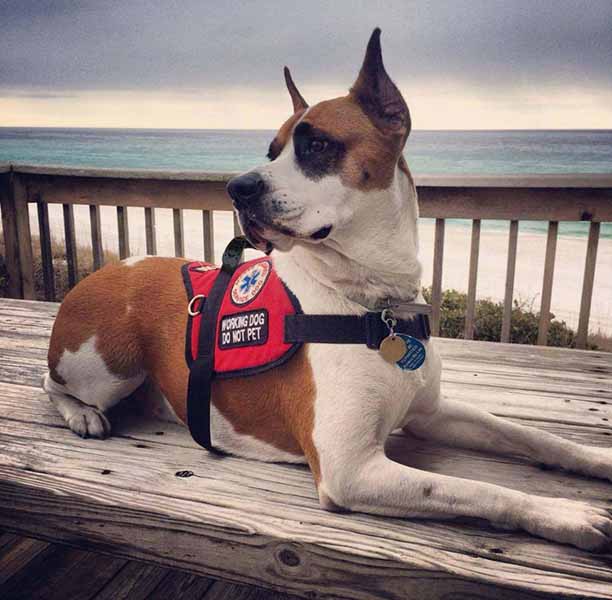The first time you encounter a service dog or a service animal in your restaurant, your initial reaction is probably “that’s against health code.” You’re not wrong, but when it comes to service dogs, you also need to consider the Americans with Disabilities Act (ADA). Health code and the ADA sometimes come into conflict regarding animals in restaurants. When you add emotional support animals, it gets even (ahem) hairier. But the short answer is yes, service dogs are allowed in restaurants; emotional support animals are not.
Here’s everything you need to know to stay on the right side of the law.
What Is a Service Animal?
A service animal, as defined by the Americans with Disabilities Act (ADA), is a dog—any breed or size—trained to perform a task that is directly related to a person’s disability. It is important for business owners to note what this definition contains and what it leaves out.
First and foremost, a service animal under the ADA is a dog. A cat, flying squirrel, or snake cannot be a service animal under the ADA. And yes, over my years managing restaurants, I have had customers attempt to tell me all of those animals were service animals.
Also, note that a service dog can be any breed or size. So don’t assume that the pitbull or the chihuahua in your dining room is not a service animal; either of them could be.
Rules Pertaining to Service Dogs in Restaurants
There are several laws that relate to animals in a restaurant or food service business. To ensure your business is in compliance with ADA, FDA (Food and Drug Administration), and health department regulations, you need to start with identifying whether an animal is a service dog.
How to Identify Service Dogs
Service dogs are not required to wear identifying tags or harnesses, though many do. Sometimes, however, people put service dog harnesses on their pets in an attempt to bring them into public spaces as service animals. The only way to identify a service dog is to ask if the animal is a service dog. Under the ADA, you are absolutely permitted to ask if a dog is a service animal.

Questions You Can Legally Ask
There are two questions you can legally ask of a customer who brings a service dog to your restaurant. They are:
- Is the dog a service animal required because of a disability?
- What work or task has the dog been trained to perform?
The phrasing of those questions is taken directly from the ADA website. I have always asked these questions exactly this way; I never wanted to verge into the territory of questions I am not allowed to ask.
Customers with disabilities and trained service dogs have never been offended when I asked these questions. Many of them thanked me for checking, as others attempting to pass off their pets as service dogs creates a lot of problems for people with disabilities. The second question is also helpful for your staff. If you know what task the dog is trained to perform, you know how to best stay out of its way.
Questions You Are Not Legally Allowed to Ask
Virtually any other question you might want to ask about a service dog is not covered by the ADA. You cannot ask to see a license or certification for the dog, and you definitely cannot ask any questions about the handler’s disability. You cannot ask to see the dog perform its task.
Service Animals Vs Emotional Support Animals
There is a confounding factor to the service dog conversation: emotional support animals. Many customers think that their emotional support animal is the same as a service dog. But emotional support animals are not covered by the ADA. So, you cannot legally permit emotional support animals in your interior dining room. Most customers do not know this because a federal law—the Air Carrier Access Act—allows them to bring their emotional support animals on planes with a note from their doctor.
When a customer arrives at your restaurant with their emotional support animal and a letter stating that their animal is an emotional support animal, be kind and patient. In the heat of a busy meal service, patience can be challenging. But you need to explain to this customer—with regret—that unfortunately the ADA does not cover emotional support animals, so you are not excused from honoring health codes to accommodate them.
In these cases, it can be helpful to print out the ADA guidance on service animals and have it handy in your front desk or managers’ office, so you can educate these customers about your obligations under the law. In my experience, I had about a 50% success rate with this. Some patrons with emotional support animals were angry no matter what I said or how kindly I said it.
Challenges of Service Dogs in Restaurants
Managing the needs of customers with service animals alongside health code, ADA compliance, and the needs of service is stressful. Even when you do it right, you might still get a pop-up complaint days or weeks later. When I managed a restaurant in Hollywood, we were completely in ADA and health code compliance, but a disgruntled customer called the health department with an anonymous complaint, saying that we had allowed “pets” in our interior dining room.
Days later, the health department visited. The owner and I had to sit through a 40-minute lecture about health code and post signs inside the restaurant stating that animals are not permitted inside the restaurant (even though service animals technically still are). We did everything right, but still lost operational hours dealing with a baseless complaint. If we had “repeated violations,” we could have faced some fines and a lowering of our health rating.
The biggest challenge you face as a restaurant is identifying true service animals, and getting customers who try to pass off their pets as service animals to cooperate to help you comply with health code.
If your state has a law penalizing fraudulent service animals (33 states do), posting the consequences somewhere in your restaurant can give you and your staff something to point to when you suspect a guest’s dog is not a service animal. For example, in California—where I worked for more than a decade—it is a misdemeanor to claim a pet is a service dog. Violators can face a $1,000 fine or up to six months in prison. Texas also classifies fraudulent service dogs as a misdemeanor, punishable with a fine of $300 and 30 hours of community service.
Tips for Managing Service Dogs in Restaurants
In more than a decade running restaurants and other food businesses, I have never seen a service dog cause any problems. Any problems with animals in my restaurants have come from pets (that are legally permitted in patios in some locations) and fraudulent service dogs. It’s important to remember that service dogs are working animals that provide a needed service to disabled people.
Print the laws
Print the relevant section of the law from the ADA website and from your state health department. Laminate these copies and put them in your office and at your front desk so your staff can easily reference them. Make these copies presentable enough that you feel comfortable showing them to customers if necessary.
The only times I have ever had to point out sections of the law were occasions when customers wanted me to allow their pet or emotional support animal inside the restaurant. The ADA clearly states that emotional support animals are not covered by the ADA. Most of the customers I point this out to are not aware of this and try to show me the letter they use for air travel.
Hold a staff training session
Gather accurate information from ADA.gov, your local health department, and any local laws pertaining to service dogs and fraudulent service animals. Train your entire staff with accurate information. If it’s possible, bring in a representative from a service dog training company who can answer questions in a low-pressure setting.
Beyond the legally allowed questions you can ask, you’ll want your servers and other staff to understand how to accommodate service dogs. Train your team not to pet or otherwise distract service dogs. And if the handler requests food or water for the service dog, it can only be served in single use, disposable containers.
Stick to the script
Use the approved language from the ADA when asking questions about service dogs. Determine your preferred language for enforcing other policies, such as how you want to handle emotional support animals and pets (where permitted). Stick with the same message and the same words. You might have to say “I’m sorry, but emotional support animals are not covered by the ADA and cannot be allowed inside the restaurant” a dozen times. Don’t let frustration force you off your message. Take a deep breath and stay calm.
Frequently Asked Questions (FAQs)
Below are some commonly asked questions about service dogs in restaurants.
Bottom Line
To comply with the ADA, you must allow service dogs anywhere in your restaurant that the public is generally permitted to go. This means patios, dining rooms, restrooms, and bars. Emotional support animals are not covered by the ADA as service animals, even if the patron shows you a letter stating the animal’s ESA status.



